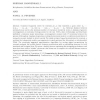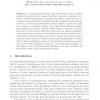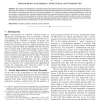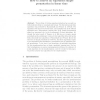10 search results - page 1 / 2 » Transforming cabbage into turnip: polynomial algorithm for s... |
STOC
1995
ACM
13 years 8 months ago
1995
ACM
Genomes frequently evolve by reversals (i, j) that transform a gene order 1 . . . iiϩ1 . . . jϪ1j . . . n into 1 . . . ijϪ1 . . . iϩ1j . . ....
COCOON
2005
Springer
13 years 10 months ago
2005
Springer
In computational biology, gene order data is often modelled as signed permutations. A classical problem in genome comparison is to detect conserved segments in a permutation, that ...
WABI
2005
Springer
13 years 10 months ago
2005
Springer
—We propose new algorithms for computing pairwise rearrangement scenarios that conserve the combinatorial structure of genomes. More precisely, we investigate the problem of sort...
CPM
2009
Springer
13 years 11 months ago
2009
Springer
A sequence of reversals that takes a signed permutation to the identity is perfect if it preserves all common intervals between the permutation and the identity. The problem of com...
RECOMB
2007
Springer
14 years 5 months ago
2007
Springer
The problem of Sorting signed permutations by reversals is a well studied problem in computational biology. The first polynomial time algorithm was presented by Hannenhalli and Pev...




